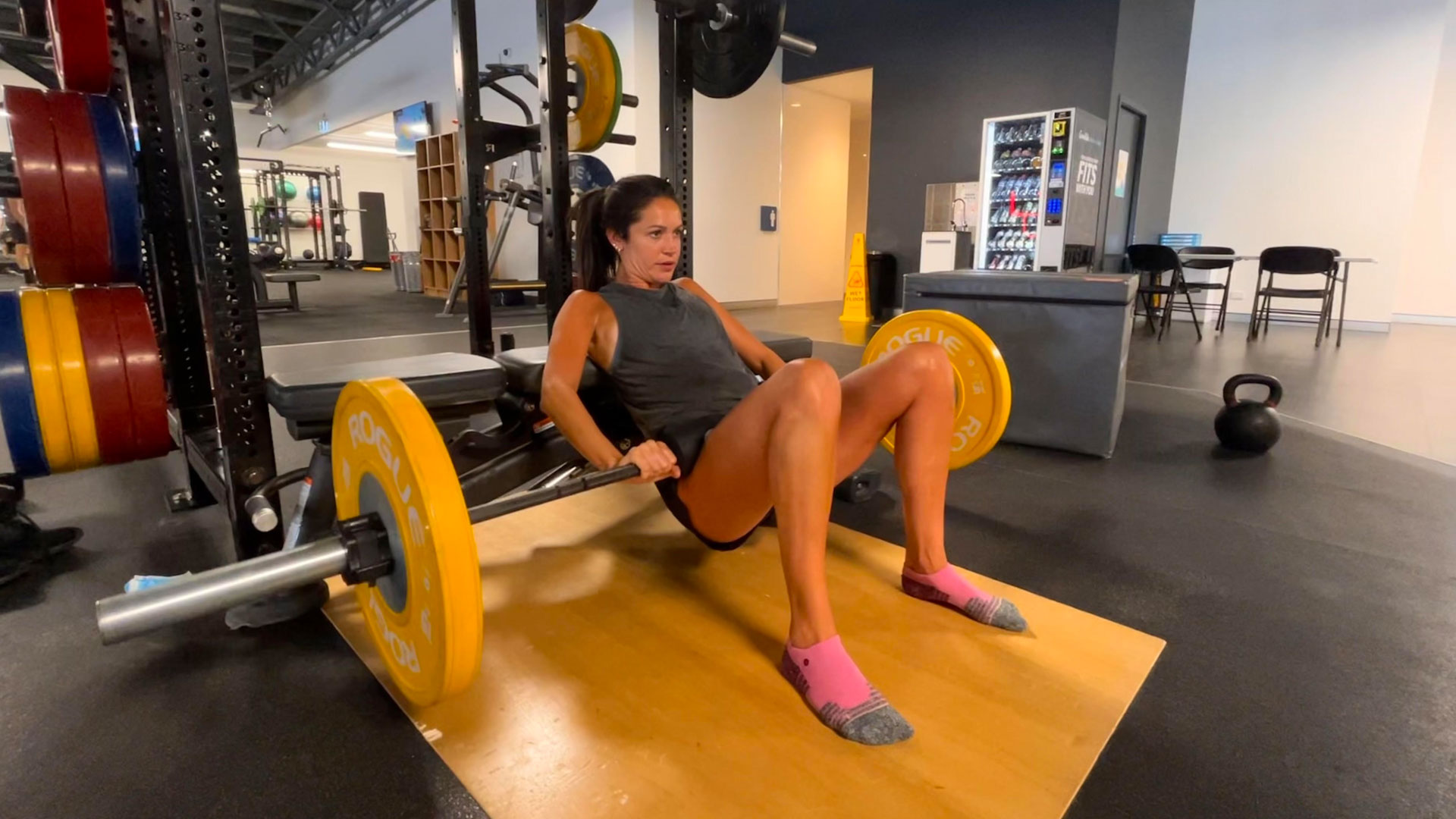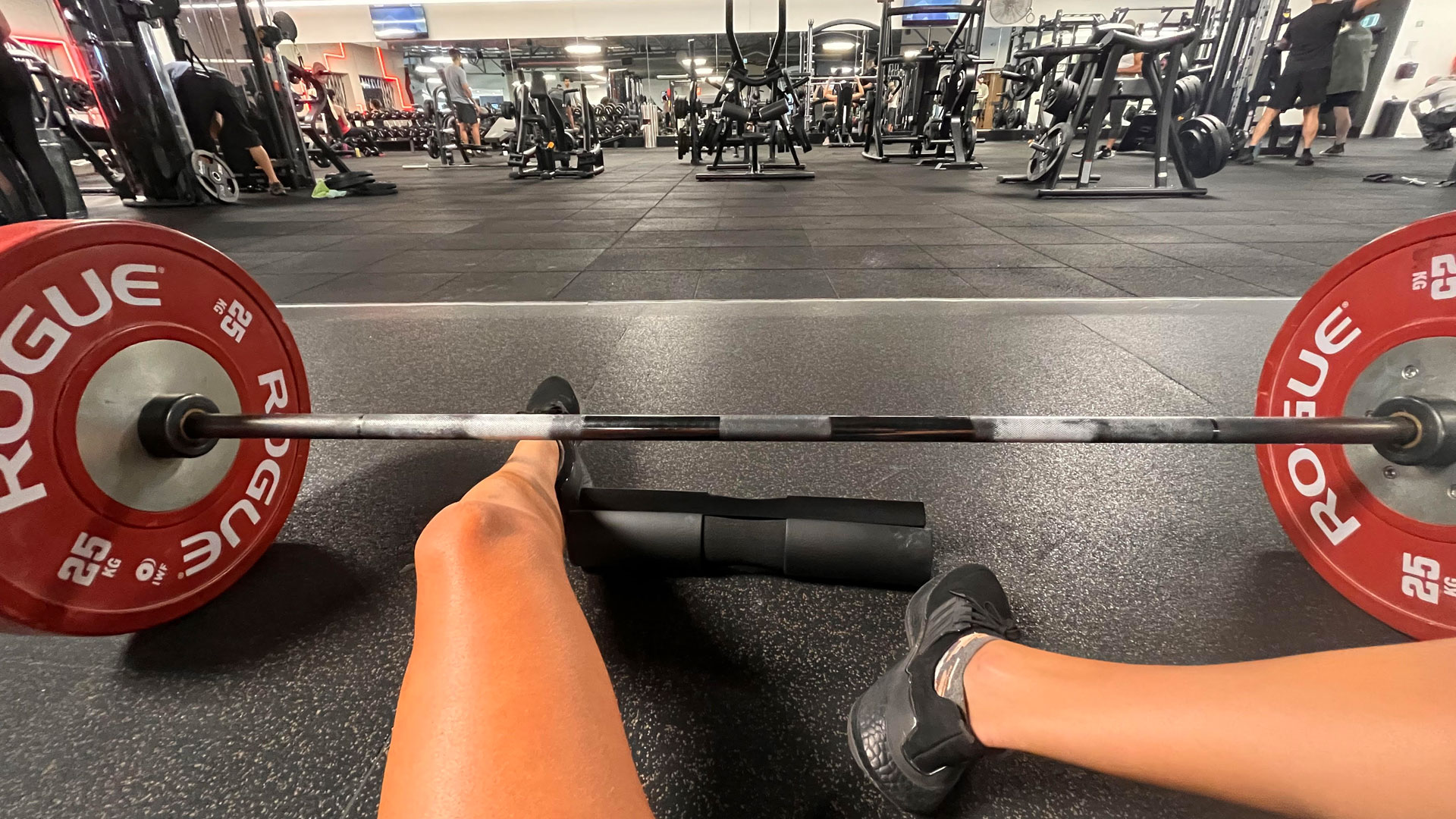I did 25 hip thrusts a day for two weeks, here’s what changed
The hip thrusts for 14 days challenge has been a game changer


I’m a slave to hip thrusts; they’ve been a lower-body staple of my gym-based leg days for years because it works the glutes, the muscles in your butt. So, the thought of doing the hip thrusts for 14 days challenge filled me with joy.
Hip thrusts provide high levels of gluteus maximus activation, the gluteus maximus being the biggest of the three muscles that make up the glutes. The other two are the gluteus minimus and gluteus medius.
Hip thrusts aren’t just a means of getting, or maintaining, pert glutes, they also help strengthen the glutes, which can help with a multitude of other exercises, as well as improving posture and helping to avoid injury.
How so? Many of us spend much of our time sitting down, which can lead to lazy glutes. When our glutes are inactive, other muscles have to overcompensate and that can lead to injury. If you’re a runner, you’ll want to ensure your glutes stay strong, as studies have found that strong glutes lessen the chances of running-related injuries, including knee pain and hamstring strains.
The hip thrusts challenge consisted of 14 days of 25 to 30 weighted hip thrusts every day. It may not sound like many, but I was using either a barbell and plates or a hip thrust machine with plates added, working with weights of between 165lb (75kg) and 198lb (90kg). Under normal circumstances, I’d take a couple of days off from hip thrusts before going at them again; to go for 14 consecutive days would be a shock to my glutes. I’m a personal trainer so know that giving muscles a break allows them to recover and grow.
Here’s what happened.
1. My glutes were always hurting
As I wasn’t allowing my glutes to recover between sessions they never really healed. I was always in nagging pain, especially in my left glute. I was doing hip thrusts every day for two weeks and was therefore inclined to do other lower-body moves, too. Essentially, I did 14 leg days back-to-back. I don’t recommend this without building up your strength safely. This constant lower-body exercise meant my leg muscles were feeling it, day after day, and as a result everyday tasks, such as walking up stairs and vacuuming, became more challenging.
Start your week with achievable workout ideas, health tips and wellbeing advice in your inbox.
2. I 100% noticed butt growth
If you want to grow and develop glutes I can tell you, from a personal trainer perspective, that hip thrusts need to be a part of the routine. In regular life, doing them every day will not be beneficial as your glutes will never get the rest they need to recover and grow. However, for this one-off challenge I noticed that my glutes grew, though this may have been just a constant “pump” as I never took days off.
3. My abs felt stronger
During any resistance-based moves the core muscles should be engaged. This helps to reduce the risk of injuries, especially to the back. I was engaging my core muscles while doing hip thrusts and I was aware that they became stronger. Of course, for abs to really show up the layer of fat that sits on top of them needs to fade away. Don’t embark on this hip thrust challenge if you think it’s going to mean a flat stomach with washboard abs.
4. I increased the weight fairly quickly
I thought the fact I was doing hip thrusts every day for 14 days would mean I’d struggle to increase my weight—as my glutes were unable to recover properly. However, by the end of the two weeks I was adding extra plates to my bar, and doing the same rep count.

5. My love for hip thrusts remains
I swear by this move to keep my butt relatively peachy. It’s never going to be big, per sé, as I don’t build up my weight too much, tending to maintain a steady weight rather than switching up my reps, rest and holds. My love for this move will never fade, as the feeling of that butt burn keeps me hooked.
6. I was hungrier
I felt hungrier during this 14-day challenge, though I was on my period for part of it, and that may have had an impact. I incorporated my hip thrusts into leg days, and was doing far more of those than usual. Leg days work some of the biggest muscles in the body, so it was natural I was going to feel hungrier. I was craving more carbs throughout the day and found that no matter how much I ate I never felt full.
Lifting weights pushes your muscles to the max, and muscles need feeding. It’s therefore natural to feel hungry. I don’t track calories, so have no idea how much I was consuming. However, I tried to ensure I was getting plenty of protein, from lean protein sources, as it is the building block of muscle.
Hip thrusts for 14 days challenge: my verdict
Do it. OK, maybe do it but leave a day between each round of hip thrusts, just so the glutes can recover between sets—especially if you’re pushing your hip thrust weight to the max.
I think this is my favorite challenge to date. I basically “had” to do my favorite move 14 days on the trot. There is nothing I could dislike about this.
I noticed changes in my glutes: they’re rounder, firmer, and a little peachier—and I improved my hip thrust form and felt stronger. I’m going to aim for three rounds of hip thrusts a week in the future, rather than my usual two, and believe I will try to add more variation to my holds, pulses and rep counts.
If you want to boost your butt, turn to the hip thrust. It’s a move like no other.
This isn’t the only challenge I've attempted. Find out what happened when I did 100 weighted squats every day for two weeks.
Hip Thrust FAQs
What happens if you do hip thrusts every day?
Doing hip thrusts regularly is a surefire way to strengthen your glutes and hamstrings. The glutes are necessary for practically every movement we do: whether standing up from a seat or walking, running and jumping. Ensuring the glutes are active and strong helps us move with ease, while taking the strain off other muscles and joints—which reduces the chance of injury and pain.
However, doing hip thrusts every day, especially if you’re maxing out the weight, could leave your glutes fatigued, with little recovery time. It may be better to leave a day between exercises so that your muscles can repair.
How effective are hip thrusts?
Hip thrusts are effective at targeting the glutes—the biggest muscle group in the body—and are one of the few exercises that isolate those muscles. They also target the hamstrings, which help support the glutes.
Weak glutes can lead to sore knees and ankles, as well as tight hip flexors, so targeting the glutes with hip thrusts is beneficial. Also, no matter what sport or activity you do, strong glutes are vital. Hip thrusts can help here.
In order to isolate the glutes even more—and ensure that your lower back isn’t taking the strain—pause for a couple of seconds at the top of the hip thrust and squeeze your glutes. Be sure to place your feet correctly so the glutes are being worked correctly, as opposed to other lower-body muscles. Your shins should be perpendicular to the ground.
Can you grow glutes with only hip thrusts?
You can grow glutes just with hip thrusts, as long as you’re using enough weight, gradually increasing the weight over time, and doing the right number of reps.
However, there are reasons why exclusively doing hip thrusts may not be the best way to build a butt. For a start, you’d need to be doing a high number of thrusts to get the glutes growing. A typical leg workout may take an hour, for example, and not many people want to spend that just on hip thrusts. As the glutes are the primary muscle being worked during a hip thrust, this will tire out the muscles more than usual and may mean you need longer to recover between workouts.
Growing your glutes might be the sole aim of your workout, though there are several muscles attached to them, and ensuring these are also strong will support your glutes and lessen the chance of injury.
And of course, only doing hip thrusts will get boring, and no one wants to put themselves through a dull workout.
How many times should I do hip thrusts?
The number of sets and reps depends on your goals. If you’re looking to grow your glutes, aim for a maximum of five sets with 10 to 12 reps in each set. Use a weight that makes the final two reps a challenge to complete.
If you want to build strength then you want to use a heavier weight. Do a maximum of five sets again, but aim for six reps in each set, with longer rest times between sets.
If you want to build muscular endurance increase the reps: aiming for 15 to 17 reps and, again, a maximum of five sets.
Aim to allow at least a day between hip thrust workouts, so your muscles can recover and come back stronger. If you don’t let muscles recover, you will never see the results you’re hoping for.
How long should you rest between hip thrust sets?
The amount of time that you should rest between hip thrust sets depends on what your aims are—as well as the weight you’ve been using. If you’re working to build strength, you’ll likely be going heavier, so your glutes will need a couple of minutes to recover between sets. Try to rest for a maximum of three minutes. If you’re working with a higher rep count and a lighter weight—if you’re hoping to build muscular endurance, for example—then a rest of around 60 seconds will suffice.
Lucy is a freelance journalist specializing in health, fitness and lifestyle. She was previously the Health and Fitness Editor across various women's magazines, including Woman&Home, Woman and Woman’s Own as well as Editor of Feel Good You. She has also previously written for titles including Now, Look, Cosmopolitan, GQ, Red and The Sun.
She lives and breathes all things fitness; working out every morning with a mix of running, weights, boxing and long walks. Lucy is a Level 3 personal trainer and teaches classes at various London studios. Plus, she's pre- and post-natal trained and helps new mums get back into fitness after the birth of their baby. Lucy claims that good sleep, plenty of food and a healthy gut (seriously, it's an obsession) are the key to maintaining energy and exercising efficiently. Saying this, she's partial to many classes of champagne and tequila on the rocks whilst out with her friends.
